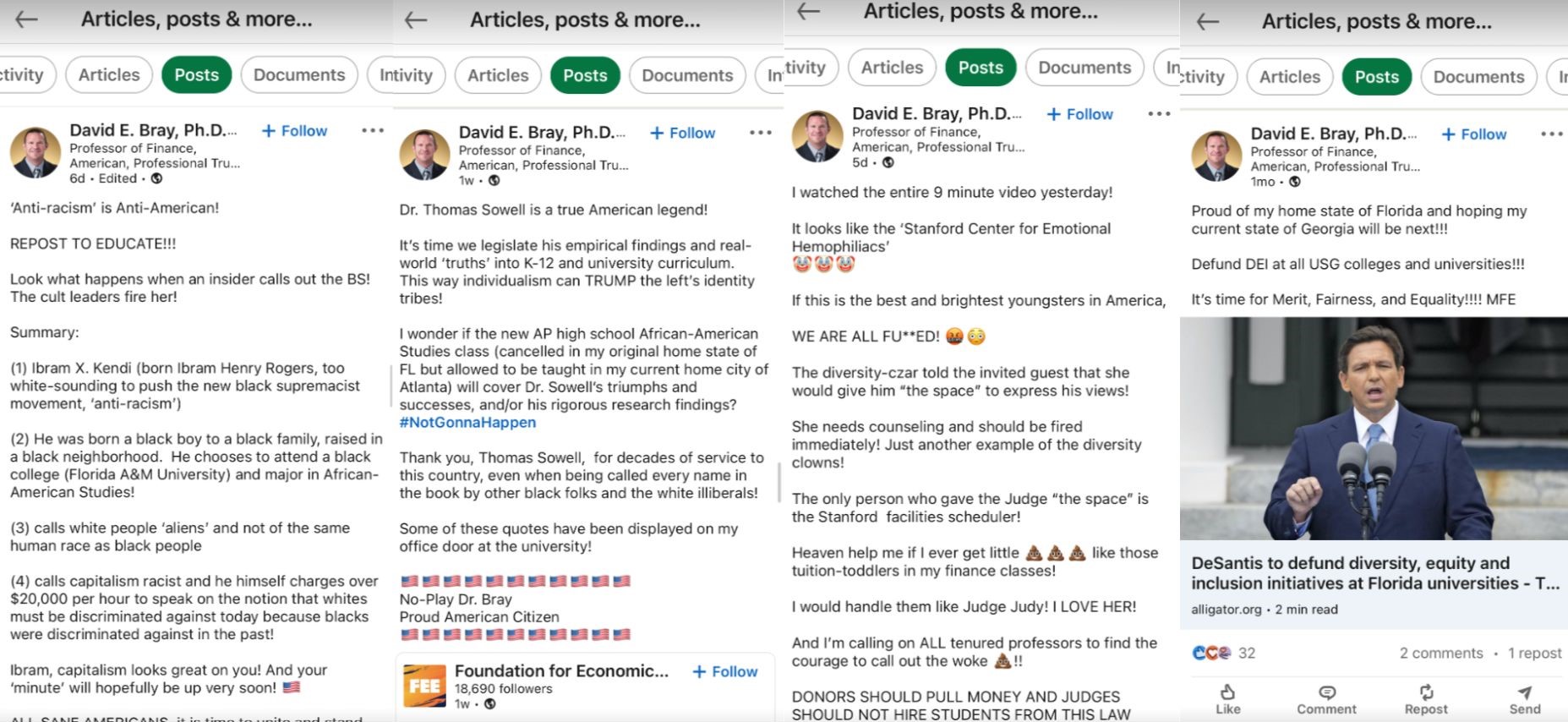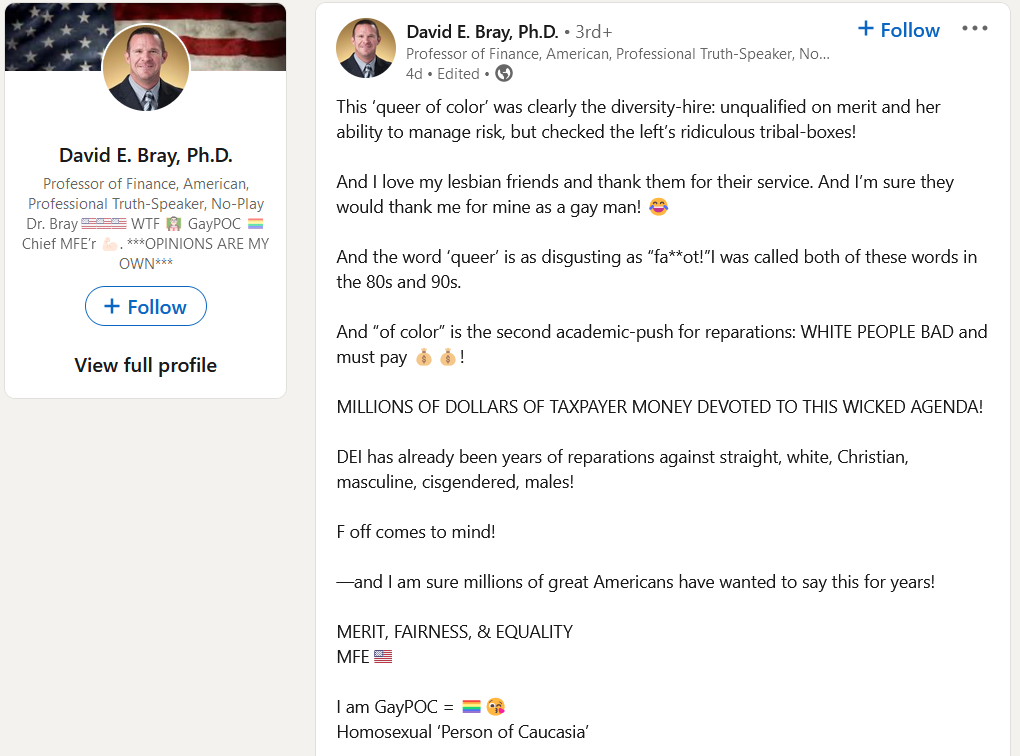'Hilarious/handsome/homosexual' professor defied leftists' speech patrols. The university launched an investigation.
Bray's outspoken LinkedIn posts garnered the attention of conservatives who agreed with him, as well as of campus progressives who saw his sentiments as problematic.
One former administrator told Campus Reform that he believes that 'the university administration is persecuting Dr. Bray and altering its standard procedures.'
This professor’s story reveals how unregulated speech policies on campus can be weaponized against individuals who do not toe the Diversity, Equity, and Inclusion (DEI) line.
Last month, the Supreme Court avoided addressing colleges’ controversial ‘bias reporting’ systems, when it declined on hearing Speech First v. Sands, a case dealing with the now defunct Virginia Tech policy that allowed students to report their peers’ perceived ‘biases’ anonymously.
Bias reporting systems have been in place at universities for years, and legal groups like Speech First and others have long been sounding the alarm on the various ways they infringe on the rights of both students and professors. While real, those concerns are often theoretical– dealing with hypotheticals and concerns over ‘chilled’ speech. But the systems can also target individuals who do not comply with the terminology and speech regulations preferred by the far left.
That’s where David Bray comes into play.
Bray, a tenured professor of finance at Kennesaw State University, uses the pronouns “hilarious/handsome/homosexual” in his email.
Before 2020, Bray was a liberal Democrat, but says the post-George Floyd cultural upheaval made him “wake up” to a world where “the word conservative doesn’t scare” him.
A Faculty Senator compelled to speak out “for people who couldn’t,” Bray considers his vocal opposition to DEI the moment he earned the ire of progressives. His outspoken LinkedIn posts garnered the attention of conservatives who agreed with him, as well as of campus progressives who saw his sentiments as problematic.

In March of 2023, Kennesaw Assistant Vice President for Academic Affairs and English Professor LaJuan Simpson-Wilkey contacted Bray and informed him about an anonymous complaint against him that came through the school’s “Compliance and Ethics Reporting Hotline”– a tool that was at the time under the purview of Chief Internal Auditor Jay Thomas, who just recently announced his resignation effective Feb. 16, 2024.
Specifically, the complaint asserted that “David Bray is going on unhinged racist rants on LinkedIn. Clearly suffering from mental illness and too unstable to be teaching classes.”
Bray tells Campus Reform that Simpson-Wilkey informed him of this complaint over the phone, and then proceeded to read Bray’s own individual LinkedIn posts (pictured above) to him and asked Bray if he remembered making them.
Bray says that he responded by saying “100%, I am the author of them and I stand by them,” and that Simpson-Wilkey “got quiet” when he “informed her that I am aware of the current hostility on campus toward folks with more conservative viewpoints such as myself.” He also says he made sure to tell her that the call felt a little like workplace harassment.
Then, Bray says, the administrator changed the subject, asking him about interactions with students in the classroom. Bray refused to answer these questions, telling Simpson-Wilkey that they were outside the scope of the phone call, and that she was now treading closely to infringing upon his academic freedom.

“We’re living in a world where tenured professors with the highest job security on planet Earth, aren’t comfortable speaking out about these things,” Bray told Campus Reform. “And they’ve created these types of systems and these tools that helped create that atmosphere.”
“I think that’s the typical leftist go-to is ‘whenever we have no facts, and we can’t silence somebody who’s making sense’,” Bray said. “We simply label them as a nutjob. I’ve seen it done before. We’ve all seen it. Where ‘Oh, the conservatives, they’re just mentally unhinged and unwell because we can’t combat that reality.’”
“Because I’m a tough cookie, I tend to handle them somewhat better than other people. But at the same time, I was embarrassed,” said Bray, pointing out that a claim about his own mental health being addressed via an English professor over the phone not only seemed inappropriate, but also underscored his concern that conversation about his mental health was now “floating around” university administration, rather than being handled through proper channels.
Bray’s attorney, Samantha Harris, echoed these concerns in a July 2023 letter to university Vice President and Chief Legal Affairs Officer Nwakaego Nkumeh Walker, noting that “the university’s own records belie the notion that the investigation was about Dr. Bray’s mental health.”
“As an initial matter, there were no mental health professionals involved in the investigation– rather, the investigation was conducted by Dr. LaJuan Simpson-Wilkey, the Assistant Vice President for Academic Affairs,” Harris wrote. “Further, a draft investigation report obtained through public records requests…reveals that the investigation was ‘Concerning LinkedIn Posts’ and that Dr. Simpson-Wilkey reviewed Dr. Bray’s course evaluations looking for ‘evidence that he has mistreated any student based on their membership within a protected class’– an allegation that was not part of the original complaint, but rather, that Dr. Simpson-Wilkey simply presumed might be the case because of the opinions Bray expressed on LinkedIn.
The following month, Bray met with two individuals from the Internal Audit Department to review the same report, as well as his course evaluations. Although these turned up no corroborating evidence to claims that Bray was racist or mentally disturbed, Bray says he worries that this sets a concerning precedent for his continued individual dealings with administration. “So now they’re priming them for next steps against me,” he suggested.
“I think the most concerning thing to me was that they then went into my student evaluations for the calendar year 2022 looking for evidence to support this bogus claim,” Bray told Campus Reform. “So my fear is moving forward….maybe they’ll get some of these students who are the left-wing ideologues on campus to take my sections, and then put these little statements and tidbits in the course evaluations.”
In May 2023, the academic free speech legal defensive group Foundation for Individual Rights and Expression (FIRE) stepped in to the matter.
In its letter, FIRE advised University President Kathy Schwaig that the school violated Bray’s constitutional rights. Kennesaw violated these rights when Simpson-Wilkey contacted him without Bray having been given a cursory review of the facts, according to the nonprofit foundation.
“If KSU wants to both maintain and comply with its First Amendment obligations, it must undertake a facial review of any complaints and first determine whether the conduct alleged constitutes protected expression,” the letter states.
A June response from Nkumeh Walker to FIRE insists that the school “did not” investigate Bray for his LinkedIn posts because the school had already “determined that the posts are protected under the First Amendment.” Instead, she says, the purpose of the “review” was simply to “determine whether there have been student complaints about Dr. Bray’s behavior in assigned classes or evidence that he has mistreated any student based on their membership within a protected class.”
One former administrator told Campus Reform that he believes that “the university administration is persecuting Dr. Bray and altering its standard procedures in order to do so,” explaining that “the standard procedure for handling hotline complaints about professors at KSU is for the administrator (at the university level) who receives the complaint to forward it to the Dean of the College where the professor resides,” and that “the Dean then assigns the investigation to an Associate Dean who investigates and fills out a form provided by the complaint review committee (this is a university level committee).”
“Alarm bells went off for me when I heard that Dr. Bray’s investigation was being conducted by an administrator at the university level who was a DEI advocate, the administrator said. “It seemed clear to me that ‘the fix was in’” and that this deviation from procedure was nothing more than a conviction before the fact because Dr. Bray is a thorn in the side of the DEI agenda at KSU,” the former administrator continued. “I became more alarmed when Dr. Bray shared emails from that investigator that contained falsehoods and contradictions. Dr. Bray has done himself a tremendous service by preserving these communications as they indicate the nonstandard and biased nature of the investigation.”
Simpson-Wilkey’s employment at Kennesaw State came to an end in September 2023. She soon found a home at the University of North Georgia, where she now serves as a dean and the Associate Vice President for Academic Affairs.
Bray believes he may have been targeted specifically for his heterodox views and outspoken behavior. “I think that my LinkedIn account was getting very hot and getting traction,” he explained, suggesting that perhaps certain administrators devised a strategy “to get me both off LinkedIn and to get me to be quiet.”
In June of 2023, Bray informed Dean Robin Cheramie that he felt “unsafe, unwelcome, and that [he didn’t] belong in the Coles College because of [his] viewpoints on certain issues that [she] seem[ed] unwilling to address in a meaningful way,” and alerted the dean to what he called a “toxic and hostile environment” for “people like me with similar viewpoints.”
Two weeks later, Cheramie responded to Bray in part by suggesting that she felt an August 2022 university-wide email reminding the campus of its Freedom of Expression Policy was sufficient for addressing Bray’s concerns within his specific college. In the same email, Cheramie asserts that she was unaware of the investigation into Bray and his LinkedIn posts until he brought it to her attention.
Bray was initially informed of the complaint on March 30, 2023, and although he learned that the investigation was concluded a month later, his attorney Samantha Harris argues that the entire ordeal unjustly chilled Bray’s speech.
“If an anonymous complaint alleging that Dr. Bray is mentally ill because of his protected expression can lead to a formal university investigation, he cannot speak freely,” Harris noted. “The fact of being placed under formal university investigation, with the attendant disruption and threat of disciplinary action, is sufficient to deter a person of ordinary firmness from engaging in protected expression — a chilling effect the First Amendment does not permit.”
Simpson-Wilkey declined to comment.
Campus Reform reached out to Kennesaw State and all other individuals mentioned. This article will be updated accordingly.

